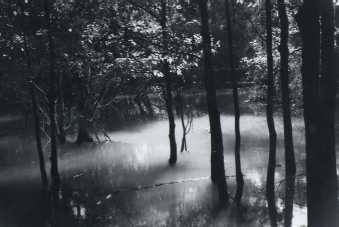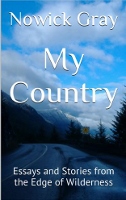HyperLife:
A Life in Hypertext

The Baby Boom
by
Nowick Gray
My mother sits in the pea-green visitor's room, her aching breasts still bound, drying up. The new baby, a month too anxious to come out, sleeps behind the antiseptic walls. From a distant time I look over my mother's shoulder and scan the table of contents of the magazine she pretends to read, the Atlantic of July, 1950:What About the British?
The Torpedoes that Failed
The Russians in China
An Explanation - A Poem
The Rescue on Station Charlie
To Wet a Widow's Eye - A Story
H-Bomb: Too Damn Close
How Do You Test a Student?
Corner of Main and Broad - A Poem
Facing Up - A Story
Mid-month, mid-year, mid-century: the watershed where I began; the divide between a past that wasn't mine, and an onrushing present history. This particular wave would carry me beyond the heavy seas of my parents' generation, over the boiling reefs of Bikini Atoll--with the great god H-Bomb casting its long and awful shadow across the waters--to some calmer sea, some provisionally safer harbor.
My parents had to suffer not only the Depression but the hell of the Second World War. I joined their quest for a tranquil resting place, on my own side of the mountain--if I may carry the watershed metaphor to its more literal conclusion. But they always seemed to be looking over their shoulders, haunted by what lay behind, on the side they'd climbed.
I moved faster, went farther. Yet my progress came slowly at first, by small journeys--beginning with that premature exit from my mother's smoke-choked body. In the early years I was content to travel in the comfort of the family station wagon. Much later, on a funky, makeshift raft, alone or with a crowd of fellow unshaven Baby Boomers, I would skirt those dying reefs, snapping digital photos and posting them after sunset to my blog. In the middle years, inevitably, I set out to blaze my own path--finding my own mountains to climb, my own streams to quench my thirst and water my garden.
A large photograph in the family album shows a smiling ex-officer, dapper and handsome in his civilian coat and tie, with slicked, short black hair, on a couch with my mother. They're holding cocktail glasses. My mother is wearing a long, flowing post-war dress, bright and flowery even in black-and-white; her shiny lipstick and smiling eyes fairly gleam out of the glossy eight-by-ten print. Bill and Jane Gray are both tall, slim and well-groomed, in the prime of life, embarking at last into the promised "American Century"--already half over.
My parents always thought of themselves (and their offspring) as better than most. My mother's father was a corn syrup "king." Her mother used to feel obliged to wear a hat to the grocery store. But their wealth, for all the pretension, wasn't of any great magnitude. All that got passed on to me was the commonplace delusion of grandeur, that I would grow up to be President someday--along with a strain of stubborn individualism that would make such a goal impossible--or at least undesirable.
When her first husband contracted a bad case of polio early on in their marriage, my mother divorced him with scarcely a second thought. She had better things to do, she explained years later to an inquisitive son, than tend a cripple. A smoker from age sixteen, my mother would carry her carton of Salems defiantly to her deathbed.
My father came to the new marriage from humbler beginnings. His mother was a Russian-Polish immigrant, his father a tobacco farmer turned city lawyer. Still, young William graduated from high school at sixteen and joined the Air Force.
"Why not the Army?" the ever-inquisitive son wanted to know.
"Because I knew that while those poor slobs would be sitting in the mud with K rations, we'd be in the officers' mess eating pork chops."
Getting shot down over France probably taught Lt. Gray some humility--and maybe an invisible fear that would eat away at him ever after, the equal of your mother's cancer. On the other hand--or perhaps in some unconscious habit of compensation--as an upwardly mobile businessman my father looked with contempt upon rivals and colleagues alike. He held on to some measure of innate arrogance, an assumed licence to characterize a rival businessman as a jerk, or his own blowhard boss as an "old blatherskite." But he buckled to the corporate mold just the same, as long as he could. What else was a guy supposed to do in "the Great Society," while supporting a family of six?
Both my parents' cockiness was undercut in my eyes by their increasing alcohol dependency. I could sense that they were not wholly to blame, for their habit was cultural--or further, a symptom of cultural despair. But neither could they stand so haughty and aloof from their peers.
In my first five years we moved three times: from Baltimore to Boston, then to Syracuse, and back to Baltimore again--places where my father ran officer's clubs. The constant moves continued when my father finally said goodbye to the service and got into the oil business. "Oh, your dad must be in the military," I'd always hear when arriving new in town. "No, oil," I'd say; "I guess it's all the same." His rise through the corporate ranks, from retail buyer to executive sales manager, took five years before landing us, by way of a couple of Baltimore brick neighborhoods and an Allegheny mountain town, in Suburbia.
I looked up to my father in those days; he carried some of the mystique of the war, glorified by Walter Cronkite's narration of combat footage on TV's "Air Power." With the fascination of the still-innocent, I studied my dad's own collection of grisly, glossy black-and-white photos: aerial shots of pockmarked landscapes and, closer in, portraits of the black, bloated dead--soldiers and horses. With reverence I fingered his parachute, his knapsack and duffel sack, the more benign tools of his trade. I outfitted myself proudly, in officer's cap and medals, for war games in the town with my friends. From time to time my father would show me a long scar on his calf, and, as if in confidence, explain it as the wound "the Japs" gave him. My mother scoffed that he wasn't even a combatant in the Asian theatre. He did run an officers club in Japan for a brief stint during the Korean War, and regaled us with another tale about eating monkey brains served up fresh at the table. Such is the mind of a boy to be enamored with a man like that.
The world I walked into redefined war and its heroes. I came to know that I would have to look elsewhere for role models. My older brother and sister were a couple of fast acts to follow. Steuart, a talented painter, married a model and became a respected architect. Sally, a straight-A student, married an all-American athlete and had seven kids. In the end it was easy for me not to care about following them, because they (besides being only half-siblings, children of my mother's first marriage) were of the fifties. Sure, I liked their music--Elvis Presley and the Everley Brothers--when I was eight years old. But Sal and Steuart would be well established with families and careers by the time Jimi Hendrix came burning onto the scene, before the Who would rock the boat with "My Generation."
These folk heroes, too, passed in their time. I turned to the gods of the more serious professions, literature and politics; quickly rejected the conventional versions, then experimented with the underground and radical alternatives. Something yet proved missing. I had to go farther--whether faster or slower I didn't yet know. To find roots deeper than 1950, deeper than the twentieth century, deeper even than civilization. To taste fresh animal flesh and blood; to sink fingers and toes into the soil.
My Generation: A Memoir of the Baby Boom
Stories - in rough chronology
The Baby Boom
The Boys in the Park
First Love
Youth
Trumped in Peckerdom
Of Ducks, Trucks and Bucks
Stephen King through Rose-colored Eyes
Just Coyotes
The Meaning of Life
Deep SummerMy Generation: A Memoir of the Baby Boom
Prefaces and Introductions . . . without end
Ebook Downloads:
Fiction and Creative Nonfiction by Nowick GrayVisit author website: nowickgray.com
Follow Nowick Gray on Facebook
.jpg)
.jpg)
